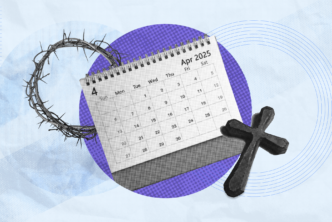It would have been hard to get through 2012 without hearing or seeing the acronym YOLO (You Only Live Once). The term regularly trended on Twitter, showed up in Facebook news feeds, and quickly became part of the pop culture vernacular.
Like a modern Carpe Diem, “YOLO!” is the cry of a generation seeking to squeeze all the possible goodness from life. If the end of your one life is death, why deny yourself happiness now?
It may seem nihilistic, but it makes sense. If this is our only opportunity to taste life’s fruit, then we should indulge. Even Paul affirms this in his discussion with the Corinthians, “If the dead are not raised, ‘Let us eat and drink, for tomorrow we die’” (1 Cor. 15:32). It would seem that, in a closed system in which death is life’s final outcome, “YOLO!” is the only rational response.
But the fact that Jesus rose from the dead changes everything. Here are three ways that Christ’s death and resurrection triumph over “YOLO!”:
1. Christ’s resurrection has made a mockery of death
“And you, who were dead in your trespasses and the uncircumcision of your flesh, God made alive together with him, having forgiven us all our trespasses, by canceling the record of debt that stood against us with its legal demands. This he set aside, nailing it to the cross. He disarmed the rulers and authorities and put them to open shame, by triumphing over them in him.” (Col. 2:13–15)2. Christ’s resurrection gives us hope
“But we do not want you to be uninformed, brothers, about those who are asleep, that you may not grieve as others do who have no hope. For since we believe that Jesus died and rose again, even so, through Jesus, God will bring with him those who have fallen asleep.”—1 Thessalonians 4:13–14
“YOLO” has an intrinsic sadness in it. The reveler who looks at life with a “let us eat and drink, for tomorrow we die” mentality cannot help but shrink from death’s inevitability, and mourn for those who’ve passed.
But the resurrection gives us hope! Death isn’t a period at the end of our lives; it’s a comma.
3. Christ’s resurrection is a new beginning
In Romans 8, Paul shows us that Christ’s resurrection kicked off a chain reaction leading to the redemption of all things.
The Spirit of he who raised Christ from the dead dwells in those who belong to him (Rom. 8:11) making us children of God and fellow heirs with Christ (Rom. 8:15–17). And all of creation, which has groaned under the weight and futility of sin has waited for the revealing of the children of God in order that it be set free from its bondage and corruption (Rom. 8:20–22). Within the resurrection of Christ lie the seeds for the restoration of all things.
It’s no wonder that Paul’s heart erupts with the admonition to “rejoice in the Lord always; again I will say, rejoice.” (Phil. 4:4)
For those who believe death has the final word, to embrace life from a “you only live once” perspective makes perfect sense. But for those whose lives are lived in the light of Christ’s resurrection, nothing in this life is “worth comparing with the glory that is to be revealed to us.” (Rom. 8:18)
The promise of Easter is that, because death is not the end, the pleasures of this world have lost their luster. I may only live once, but thanks to Jesus, it will be one long, glorious life spent in God’s presence.




